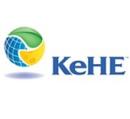When Retirement Plans Manager Jessica VanDyke reflects on the impact of KeHE Distributors’ employee stock ownership program (ESOP), she thinks of a recently retired employee named Walter.
In 1998, Walter found his way to KeHE’s Schmidt Street warehouse in Romeoville, a Chicago suburb 30 miles southwest of the city. Freshly released from a rehab program and recommended by a partner non-profit, Walter joined KeHE as an entry-level warehouse associate. Over the next two decades, Walter worked diligently — climbing the ranks to become an inventory control specialist and serving on multiple committees along the way.
When Walter finally retired from his illustrious career with KeHe — the company’s growth afforded him a windfall.
“Walter was able to pay off the mortgage on his house from his first employee stock ownership plan payout,” VanDyke told Built In Chicago. “The ESOP retirement benefit allowed him to not only own his home free and clear, but also to put his kids through nursing school — and one through college.”
But Walter isn’t the only employee who can retire comfortably from their ESOP benefits at KeHE. VanDyke reported that several long-term accounts have surpassed $1 million in value during her tenure at the company.
“The ESOP has proven to have a huge impact on the lives of employees, the owners of KeHE Distributors,” Van Dyke said.
Despite their potential for impact, employee-owned companies are a rare breed in the tech industry. There are over 6,400 employee-owned companies in the United States, covering roughly 10 million active employee participants. Though impressive, this number is just a drop in the bucket that is America’s workforce of over 61 million.
Early adopters of the ESOP found that employee-owned companies often grew at a rate three to four times faster than their competitors, and also saw an impressive uptick in employee engagement. Heartened by reports of ESOP success across the US, KeHe adopted its ESOP program in 2000 — with the hope of providing a secure future for its employees. Over 20 years later, KeHE continues to invest in the legacy of its workforce with this unique tech benefit.

KeHE Distributors is a national employee-owned food distribution company focused on natural, organic, specialty and fresh foods. KeHE Distributors aims to be a “next-generation distribution partner distinguished by innovative products and solutions.” Retirement Plans Manager Jessica VanDyke is an advocate for KeHE’s unique company structure. “Today, KeHE Distributors is one of the largest and most successful ESOP companies in the country,” she told Built In Chicago. “Due to the company’s continued growth and increased share price, our employees see the benefit directly in their ESOP retirement plan.”
Describe a unique benefit KeHE Distributions offers.
Since KeHE officially became an employee-owned company in 2000, the company maintains an employee stock ownership plan (ESOP) so that employees share in the company’s growth and have additional income for retirement. The KeHE ESOP functions as a retirement account, similar to a 401(k) or IRA. Shares are deposited into your account on an annual basis, and these contributions are entirely company-funded — the employees don’t contribute anything from their earnings. The shares remain in your account and grow in value. When you’re ready to retire, you’ll be able to cash in your shares for retirement income.
The best route for long-term, sustainable growth was for the employees to become owners of KeHE Distributors.”
Why did your company pursue this benefit? Are there any stats or data that supported this decision?
Prior to 2000, KeHE Distributors was a family-owned company. When Jerry Kehe, the President and CEO at the time, decided to transition ownership of the company, the Kehe family and the board concluded the best route for long-term, sustainable growth was for the employees to become owners of KeHE Distributors — and they were right.







